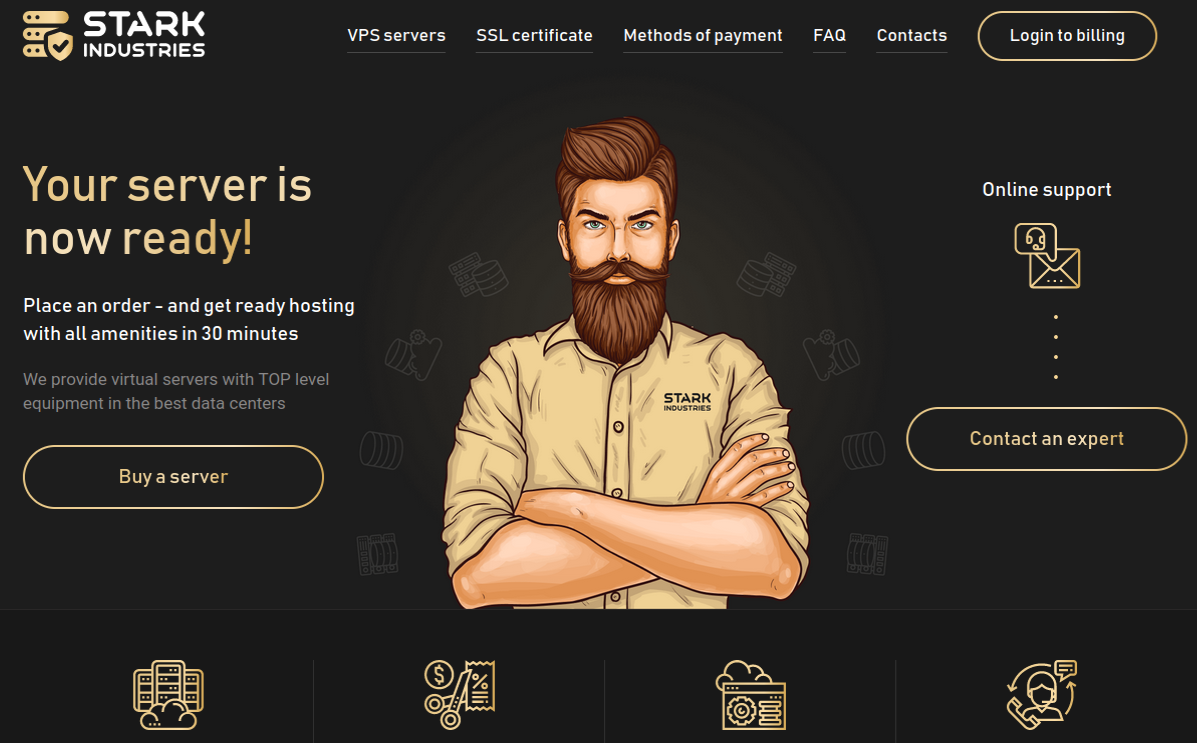
The homepage of Stark Industries Solutions.
Two weeks before Russia invaded Ukraine in February 2022, a large, mysterious new Internet hosting firm called Stark Industries Solutions materialized and quickly became the epicenter of massive distributed denial-of-service (DDoS) attacks on government and commercial targets in Ukraine and Europe. An investigation into Stark Industries reveals it is being used as a global proxy network that conceals the true source of cyberattacks and disinformation campaigns against enemies of Russia.
At least a dozen patriotic Russian hacking groups have been launching DDoS attacks since the start of the war at a variety of targets seen as opposed to Moscow. But by all accounts, few attacks from those gangs have come close to the amount of firepower wielded by a pro-Russia group calling itself “NoName057(16).”
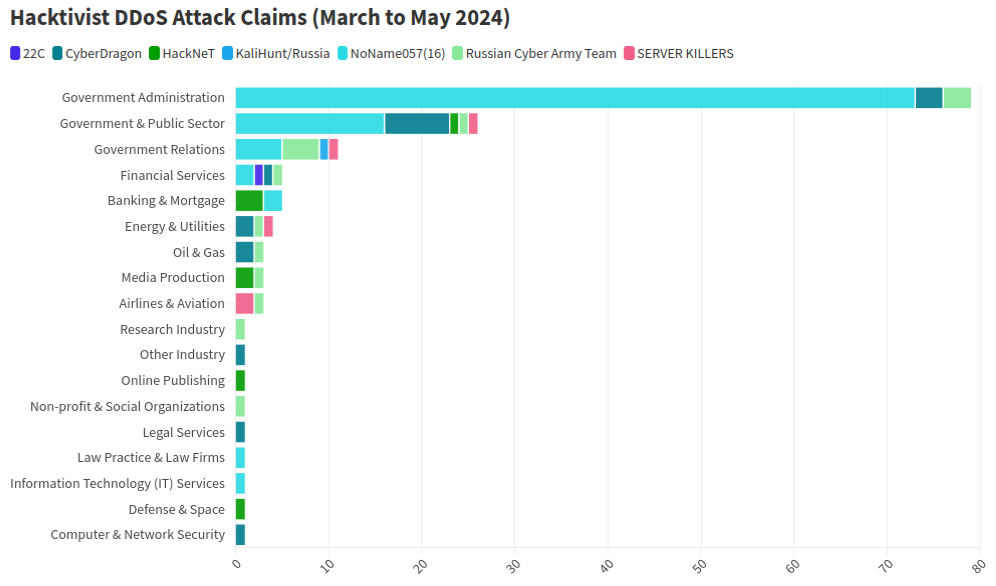
This graphic comes from a recent report from NETSCOUT about DDoS attacks from Russian hacktivist groups.
As detailed by researchers at Radware, NoName has effectively gamified DDoS attacks, recruiting hacktivists via its Telegram channel and offering to pay people who agree to install a piece of software called DDoSia. That program allows NoName to commandeer the host computers and their Internet connections in coordinated DDoS campaigns, and DDoSia users with the most attacks can win cash prizes.

The NoName DDoS group advertising on Telegram. Image: SentinelOne.com.
A report from the security firm Team Cymru found the DDoS attack infrastructure used in NoName campaigns is assigned to two interlinked hosting providers: MIRhosting and Stark Industries. MIRhosting is a hosting provider founded in The Netherlands in 2004. But Stark Industries Solutions Ltd was incorporated on February 10, 2022, just two weeks before the Russian invasion of Ukraine.
Security experts say that not long after the war started, Stark began hosting dozens of proxy services and free virtual private networking (VPN) services, which are designed to help users shield their Internet usage and location from prying eyes.
Proxy providers allow users to route their Internet and Web browsing traffic through someone else’s computer. From a website’s perspective, the traffic from a proxy network user appears to originate from the rented IP address, not from the proxy service customer.

These services can be used in a legitimate manner for several business purposes — such as price comparisons or sales intelligence — but they are also massively abused for hiding cybercrime activity because they can make it difficult to trace malicious traffic to its original source.
What’s more, many proxy services do not disclose how they obtain access to the proxies they are renting out, and in many cases the access is obtained through the dissemination of malicious software that turns the infected system into a traffic relay — usually unbeknownst to the legitimate owner of the Internet connection. Other proxy services will allow users to make money by renting out their Internet connection to anyone.
Spur.us is a company that tracks VPNs and proxy services worldwide. Spur finds that Stark Industries (AS44477) currently is home to at least 74 VPN services, and 40 different proxy services. As we’ll see in the final section of this story, just one of those proxy networks has over a million Internet addresses available for rent across the globe.
Raymond Dijkxhoorn operates a hosting firm in The Netherlands called Prolocation. He also co-runs SURBL, an anti-abuse service that flags domains and Internet address ranges that are strongly associated with spam and cybercrime activity, including DDoS.
Dijkxhoorn said last year SURBL heard from multiple people who said they operated VPN services whose web resources were included in SURBL’s block lists.
“We had people doing delistings at SURBL for domain names that were suspended by the registrars,” Dijkhoorn told KrebsOnSecurity. “And at least two of them explained that Stark offered them free VPN services that they were reselling.”
Dijkxhoorn added that Stark Industries also sponsored activist groups from Ukraine.
“How valuable would it be for Russia to know the real IPs from Ukraine’s tech warriors?” he observed.
Richard Hummel is threat intelligence lead at NETSCOUT. Hummel said when he considers the worst of all the hosting providers out there today, Stark Industries is consistently near or at the top of that list.
“The reason is we’ve had at least a dozen service providers come to us saying, ‘There’s this network out there inundating us with traffic,'” Hummel said. “And it wasn’t even DDoS attacks. [The systems] on Stark were just scanning these providers so fast it was crashing some of their services.”
Hummel said NoName will typically launch their attacks using a mix of resources rented from major, legitimate cloud services, and those from so-called “bulletproof” hosting providers like Stark. Bulletproof providers are so named when they earn or cultivate a reputation for ignoring any abuse complaints or police reports about activity on their networks.
Combining bulletproof providers with legitimate cloud hosting, Hummel said, likely makes NoName’s DDoS campaigns more resilient because many network operators will hesitate to be too aggressive in blocking Internet addresses associated with the major cloud services.
“What we typically see here is a distribution of cloud hosting providers and bulletproof hosting providers in DDoS attacks,” he said. “They’re using public cloud hosting providers because a lot of times that’s your first layer of network defense, and because [many companies are wary of] over-blocking access to legitimate cloud resources.”
But even if the cloud provider detects abuse coming from the customer, the provider is probably not going to shut the customer down immediately, Hummel said.
“There is usually a grace period, and even if that’s only an hour or two, you can still launch a large number of attacks in that time,” he said. “And then they just keep coming back and opening new cloud accounts.”
Stark Industries is incorporated at a mail drop address in the United Kingdom. UK business records list an Ivan Vladimirovich Neculiti as the company’s secretary. Mr. Neculiti also is named as the CEO and founder of PQ Hosting Plus S.R.L. (aka Perfect Quality Hosting), a Moldovan company formed in 2019 that lists the same UK mail drop address as Stark Industries.

Ivan Neculiti, as pictured on LinkedIn.
Reached via LinkedIn, Mr. Neculiti said PQ Hosting established Stark Industries as a “white label” of its brand so that “resellers could distribute our services using our IP addresses and their clients would not have any affairs with PQ Hosting.”
“PQ Hosting is a company with over 1,000+ of [our] own physical servers in 38 countries and we have over 100,000 clients,” he said. “Though we are not as large as Hetzner, Amazon and OVH, nevertheless we are a fast growing company that provides services to tens of thousands of private customers and legal entities.”
Asked about the constant stream of DDoS attacks whose origins have traced back to Stark Industries over the past two years, Neculiti maintained Stark hasn’t received any official abuse reports about attacks coming from its networks.
“It was probably some kind of clever attack that we did not see, I do not rule out this fact, because we have a very large number of clients and our Internet channels are quite large,” he said. “But, in this situation, unfortunately, no one contacted us to report that there was an attack from our addresses; if someone had contacted us, we would have definitely blocked the network data.”
DomainTools.com finds Ivan V. Neculiti was the owner of war[.]md, a website launched in 2008 that chronicled the history of a 1990 armed conflict in Moldova known as the Transnistria War and the Moldo-Russian war.

An ad for war.md, circa 2009.
Transnistria is a breakaway pro-Russian region that declared itself a state in 1990, although it is not internationally recognized. The copyright on that website credits the “MercenarieS TeaM,” which was at one time a Moldovan IT firm. Mr. Neculiti confirmed personally registering this domain.
The data breach tracking service Constella Intelligence reports that an Ivan V. Neculiti registered multiple online accounts under the email address dfyz_bk@bk.ru. Cyber intelligence firm Intel 471 shows this email address is tied to the username “dfyz” on more than a half-dozen Russian language cybercrime forums since 2008. The user dfyz on Searchengines[.]ru in 2008 asked other forum members to review war.md, and said they were part of the MercenarieS TeaM.
Back then, dfyz was selling “bulletproof servers for any purpose,” meaning the hosting company would willfully ignore abuse complaints or police inquiries about the activity of its customers.
DomainTools reports there are at least 33 domain names registered to dfyz_bk@bk.ru. Several of these domains have Ivan Neculiti in their registration records, including tracker-free[.]cn, which was registered to an Ivan Neculiti at dfyz_bk@bk.ru and referenced the MercenarieS TeaM in its original registration records.
Dfyz also used the nickname DonChicho, who likewise sold bulletproof hosting services and access to hacked Internet servers. In 2014, a prominent member of the Russian language cybercrime community Antichat filed a complaint against DonChicho, saying this user scammed them and had used the email address dfyz_bk@bk.ru.
The complaint said DonChicho registered on Antichat from the Transnistria Internet address 84.234.55[.]29. Searching this address in Constella reveals it has been used to register just five accounts online that have been created over the years, including one at ask.ru, where the user registered with the email address neculitzy1@yandex.ru. Constella also returns for that email address a user by the name “Ivan” at memoraleak.com and 000webhost.com.
Constella finds that the password most frequently used by the email address dfyz_bk@bk.ru was “filecast,” and that there are more than 90 email addresses associated with this password. Among them are roughly two dozen addresses with the name “Neculiti” in them, as well as the address support@donservers[.]ru.
Intel 471 says DonChicho posted to several Russian cybercrime forums that support@donservers[.]ru was his address, and that he logged into cybercrime forums almost exclusively from Internet addresses in Tiraspol, the capital of Transnistria. A review of DonChicho’s posts shows this person was banned from several forums in 2014 for scamming other users.
Cached copies of DonChicho’s vanity domain (donchicho[.]ru) show that in 2009 he was a spammer who peddled knockoff prescription drugs via Rx-Promotion, once one of the largest pharmacy spam moneymaking programs for Russian-speaking affiliates.
Mr. Neculiti told KrebsOnSecurity he has never used the nickname DonChicho.
“I may assure you that I have no relation to DonChicho nor to his bulletproof servers,” he said.
Below is a mind map that shows the connections between the accounts mentioned above.
Earlier this year, NoName began massively hitting government and industry websites in Moldova. A new report from Arbor Networks says the attacks began around March 6, when NoName alleged the government of Moldova was “craving for Russophobia.”
“Since early March, more than 50 websites have been targeted, according to posted ‘proof’ by the groups involved in attacking the country,” Arbor’s ASERT Team wrote. “While NoName seemingly initiated the ramp of attacks, a host of other DDoS hacktivists have joined the fray in claiming credit for attacks across more than 15 industries.”
The German independent news outlet Correctiv.org last week published a scathing investigative report on Stark Industries and MIRhosting, which notes that Ivan Neculiti operates his hosting companies with the help of his brother, Yuri.
The report points out that Stark Industries continues to host a Russian disinformation news outlet called “Recent Reliable News” (RRN) that was sanctioned by the European Union in 2023 for spreading links to propaganda blogs and fake European media and government websites.
“The website was not running on computers in Moscow or St. Petersburg until recently, but in the middle of the EU, in the Netherlands, on the computers of the Neculiti brothers,” Correctiv reporters wrote.
“After a request from this editorial team, a well-known service was installed that hides the actual web host,” the report continues. “Ivan Neculiti announced that he had blocked the associated access and server following internal investigations. “We very much regret that we are only now finding out that one of our customers is a sanctioned portal,” said the company boss. However, RRN is still accessible via its servers.”
Correctiv also points to a January 2023 report from the Ukrainian government, which found servers from Stark Industries Solutions were used as part of a cyber attack on the Ukrainian news agency “Ukrinform”. Correctiv notes the notorious hacker group Sandworm — an advanced persistent threat (APT) group operated by a cyberwarfare unit of Russia’s military intelligence service — was identified by Ukrainian government authorities as responsible for that attack.
Public records indicate MIRhosting is based in The Netherlands and is operated by 37-year old Andrey Nesterenko, whose personal website says he is an accomplished concert pianist who began performing publicly at a young age.
DomainTools says mirhosting[.]com is registered to Mr. Nesterenko and to Innovation IT Solutions Corp, which lists addresses in London and in Nesterenko’s stated hometown of Nizhny Novgorod, Russia.
This is interesting because according to the book Inside Cyber Warfare by Jeffrey Carr, Innovation IT Solutions Corp. was responsible for hosting StopGeorgia[.]ru, a hacktivist website for organizing cyberattacks against Georgia that appeared at the same time Russian forces invaded the former Soviet nation in 2008. That conflict was thought to be the first war ever fought in which a notable cyberattack and an actual military engagement happened simultaneously.
Responding to questions from KrebsOnSecurity, Mr. Nesterenko said he couldn’t say whether his network had ever hosted the StopGeorgia website back in 2008 because his company didn’t keep records going back that far. But he said Stark Industries Solutions is indeed one of MIRhsoting’s colocation customers.
“Our relationship is purely provider-customer,” Nesterenko said. “They also utilize multiple providers and data centers globally, so connecting them directly to MIRhosting overlooks their broader network.”
“We take any report of malicious activity seriously and are always open to information that can help us identify and prevent misuse of our infrastructure, whether involving Stark Industries or any other customer,” Nesterenko continued. “In cases where our services are exploited for malicious purposes, we collaborate fully with Dutch cyber police and other relevant authorities to investigate and take appropriate measures. However, we have yet to receive any actionable information beyond the article itself, which has not provided us with sufficient detail to identify or block malicious actors.”
In December 2022, security firm Recorded Future profiled the phishing and credential harvesting infrastructure used for Russia-aligned espionage operations by a group dubbed Blue Charlie (aka TAG-53), which has targeted email accounts of nongovernmental organizations and think tanks, journalists, and government and defense officials.
Recorded Future found that virtually all the Blue Charlie domains existed in just ten different ISPs, with a significant concentration located in two networks, one of which was MIRhosting. Both Microsoft and the UK government assess that Blue Charlie is linked to the Russian threat activity groups variously known as Callisto Group, COLDRIVER, and SEABORGIUM.
Mr. Nesterenko took exception to a story on that report from The Record, which is owned by Recorded Future.
“We’ve discussed its contents with our customer, Stark Industries,” he said. “We understand that they have initiated legal proceedings against the website in question, as they firmly believe that the claims made are inaccurate.”
Recorded Future said they updated their story with comments from Mr. Neculiti, but that they stand by their reporting.
Mr. Nesterenko’s LinkedIn profile says he was previously the foreign region sales manager at Serverius-as, a hosting company in The Netherlands that remains in the same data center as MIRhosting.
In February, the Dutch police took 13 servers offline that were used by the infamous LockBit ransomware group, which had originally bragged on its darknet website that its home base was in The Netherlands. Sources tell KrebsOnSecurity the servers seized by the Dutch police were located in Serverius’ data center in Dronten, which is also shared by MIRhosting.
Serverius-as did not respond to requests for comment. Nesterenko said MIRhosting does use one of Serverius’s data centers for its operations in the Netherlands, alongside two other data centers, but that the recent incident involving the seizure of servers has no connection to MIRhosting.
“We are legally prohibited by Dutch law and police regulations from sharing information with third parties regarding any communications we may have had,” he said.
A February 2024 report from security firm ESET found Serverius-as systems were involved in a series of targeted phishing attacks by Russia-aligned groups against Ukrainian entities throughout 2023. ESET observed that after the spearphishing domains were no longer active, they were converted to promoting rogue Internet pharmacy websites.
A review of the Internet address ranges recently added to the network operated by Stark Industries Solutions offers some insight into its customer base, usage, and maybe even true origins. Here is a snapshot (PDF) of all Internet address ranges announced by Stark Industries so far in the month of May 2024 (this information was graciously collated by the network observability platform Kentik.com).
Those records indicate that the largest portion of the IP space used by Stark is in The Netherlands, followed by Germany and the United States. Stark says it is connected to roughly 4,600 Internet addresses that currently list their ownership as Comcast Cable Communications.
A review of those address ranges at spur.us shows all of them are connected to an entity called Proxyline, which is a sprawling proxy service based in Russia that currently says it has more than 1.6 million proxies globally that are available for rent.
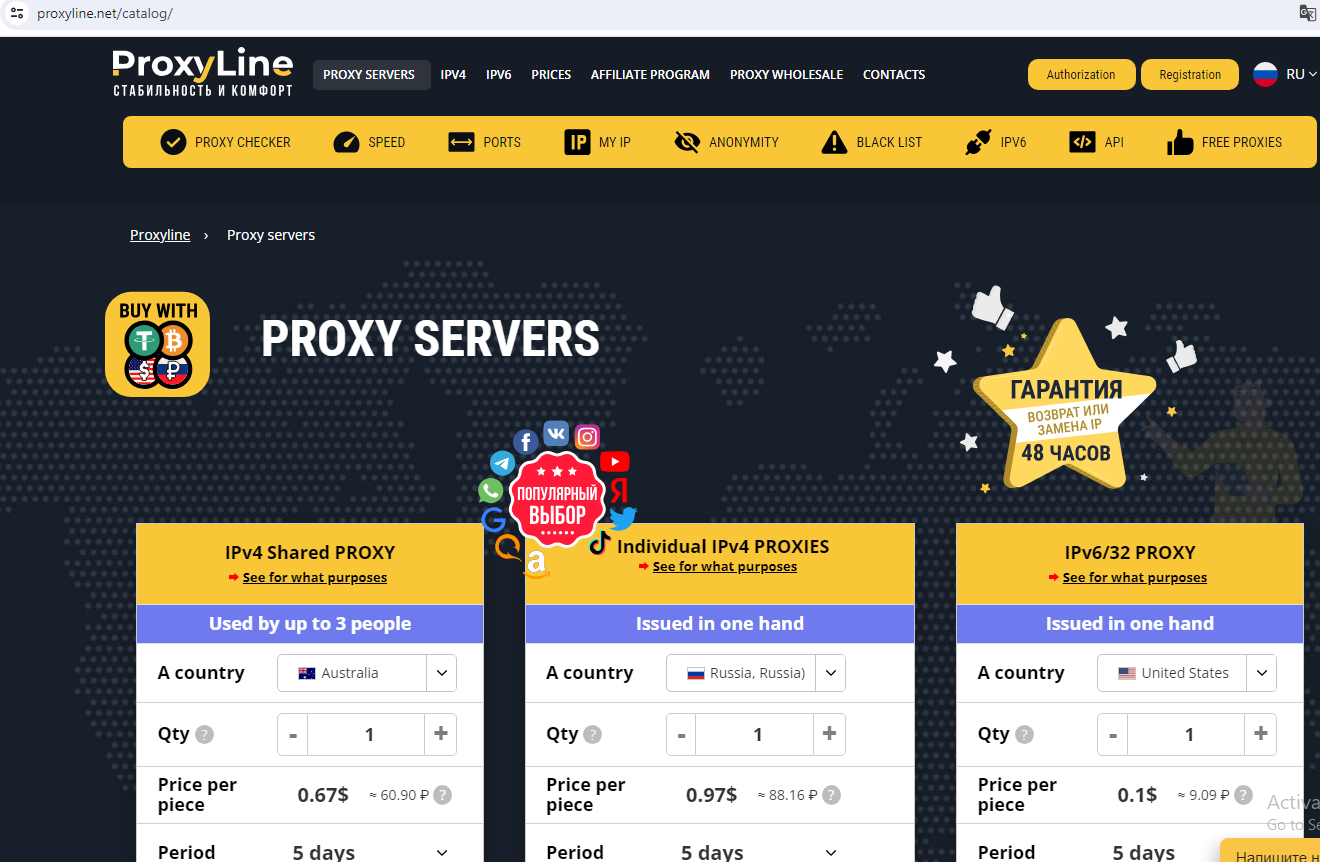
Proxyline dot net.
Reached for comment, Comcast said the Internet address ranges never did belong to Comcast, so it is likely that Stark has been fudging the real location of its routing announcements in some cases.
Stark reports that it has more than 67,000 Internet addresses at Santa Clara, Calif.-based EGIhosting. Spur says the Stark addresses involving EGIhosting all map to Proxyline as well. EGIhosting did not respond to requests for comment.
EGIhosting manages Internet addresses for the Cyprus-based hosting firm ITHOSTLINE LTD (aka HOSTLINE-LTD), which is represented throughout Stark’s announced Internet ranges. Stark says it has more than 21,000 Internet addresses with HOSTLINE. Spur.us finds Proxyline addresses are especially concentrated in the Stark ranges labeled ITHOSTLINE LTD, HOSTLINE-LTD, and Proline IT.
Stark’s network list includes approximately 21,000 Internet addresses at Hockessin, De. based DediPath, which abruptly ceased operations without warning in August 2023. According to a phishing report released last year by Interisle Consulting, DediPath was the fourth most common source of phishing attacks in the year ending Oct. 2022. Spur.us likewise finds that virtually all of the Stark address ranges marked “DediPath LLC” are tied to Proxyline.
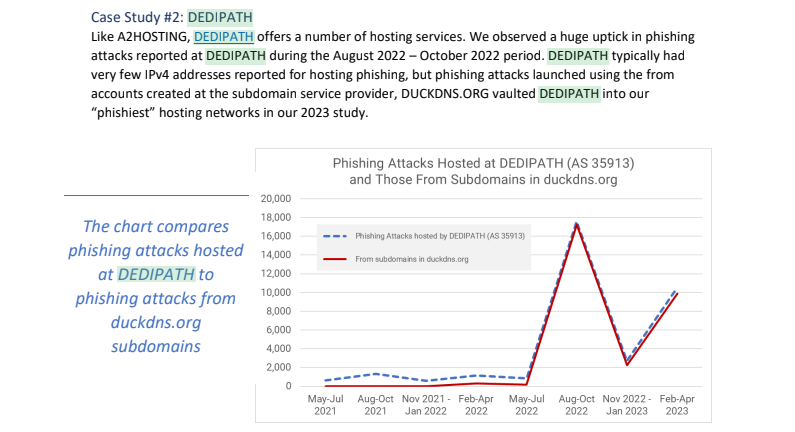
Image: Interisle Consulting.
A large number of the Internet address ranges announced by Stark in May originate in India, and the names that are self-assigned to many of these networks indicate they were previously used to send large volumes of spam for herbal medicinal products, with names like HerbalFarm, AdsChrome, Nutravo, Herbzoot and Herbalve.
The anti-spam organization SpamHaus reports that many of the Indian IP address ranges are associated with known “snowshoe spam,” a form of abuse that involves mass email campaigns spread across several domains and IP addresses to weaken reputation metrics and avoid spam filters.
It’s not clear how much of Stark’s network address space traces its origins to Russia, but big chunks of it recently belonged to some of the oldest entities on the Russian Internet (a.k.a. “Runet”).
For example, many Stark address ranges were most recently assigned to a Russian government entity whose full name is the “Federal State Autonomous Educational Establishment of Additional Professional Education Center of Realization of State Educational Policy and Informational Technologies.”
A review of Internet address ranges adjacent to this entity reveals a long list of Russian government organizations that are part of the Federal Guard Service of the Russian Federation. Wikipedia says the Federal Guard Service is a Russian federal government agency concerned with tasks related to protection of several high-ranking state officials, including the President of Russia, as well as certain federal properties. The agency traces its origins to the USSR’s Ninth Directorate of the KGB, and later the presidential security service.
Stark recently announced the address range 213.159.64.0/20 from April 27 to May 1, and this range was previously assigned to an ancient ISP in St. Petersburg, RU called the Computer Technologies Institute Ltd.
According to a post on the Russian language webmaster forum searchengines[.]ru, the domain for Computer Technologies Institute — ctinet[.]ru — is the seventh-oldest domain in the entire history of the Runet.
Curiously, Stark also lists large tracts of Internet addresses (close to 48,000 in total) assigned to a small ISP in Kharkiv, Ukraine called NetAssist. Reached via email, the CEO of NetAssist Max Tulyev confirmed his company provides a number of services to PQ Hosting.
“We colocate their equipment in Warsaw, Madrid, Sofia and Thessaloniki, provide them IP transit and IPv4 addresses,” Tulyev said. “For their size, we receive relatively low number of complains to their networks. I never seen anything about their pro-Russian activity or support of Russian hackers. It is very interesting for me to see proofs of your accusations.”
Spur.us mapped the entire infrastructure of Proxyline, and found more than one million proxies across multiple providers, but by far the biggest concentration was at Stark Industries Solutions. The full list of Proxyline address ranges (.CSV) shows two other ISPs appear repeatedly throughout the list. One is Kharkiv, Ukraine based ITL LLC, also known as Information Technology Laboratories Group, and Integrated Technologies Laboratory.
The second is a related hosting company in Miami, called Green Floid LLC. Green Floid featured in a 2017 scoop by CNN, which profiled the company’s owner and quizzed him about Russian troll farms using proxy networks on Green Floid and its parent firm ITL to mask disinformation efforts tied to the Kremlin’s Internet Research Agency (IRA). At the time, the IRA was using Facebook and other social media networks to spread videos showing police brutality against African Americans in an effort to encourage protests across the United States.
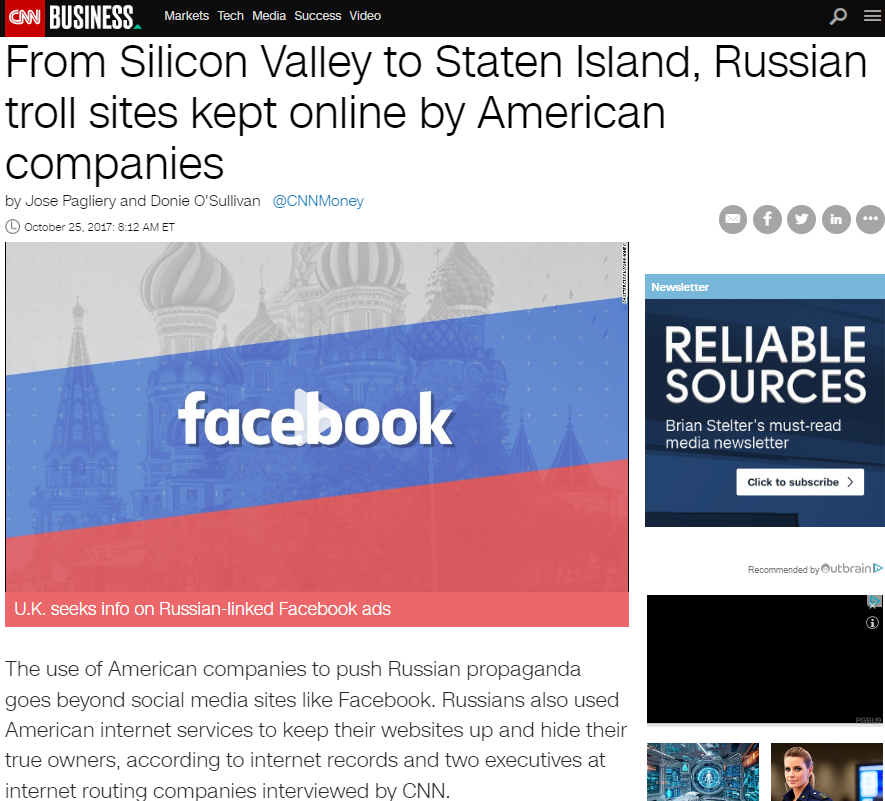
Doug Madory, director of Internet analysis at Kentik, was able to see at a high level the top sources and destinations for traffic traversing Stark’s network.
“Based on our aggregate NetFlow, we see Iran as the top destination (35.1%) for traffic emanating from Stark (AS44477),” Madory said. “Specifically, the top destination is MTN Irancell, while the top source is Facebook. This data supports the theory that AS44477 houses proxy services as Facebook is blocked in Iran.”
On April 30, the security firm Malwarebytes explored an extensive malware operation that targets corporate Internet users with malicious ads. Among the sites used as lures in that campaign were fake Wall Street Journal and CNN websites that told visitors they were required to install a WSJ or CNN-branded browser extension (malware). Malwarebytes found a domain name central to that operation was hosted at Internet addresses owned by Stark Industries.
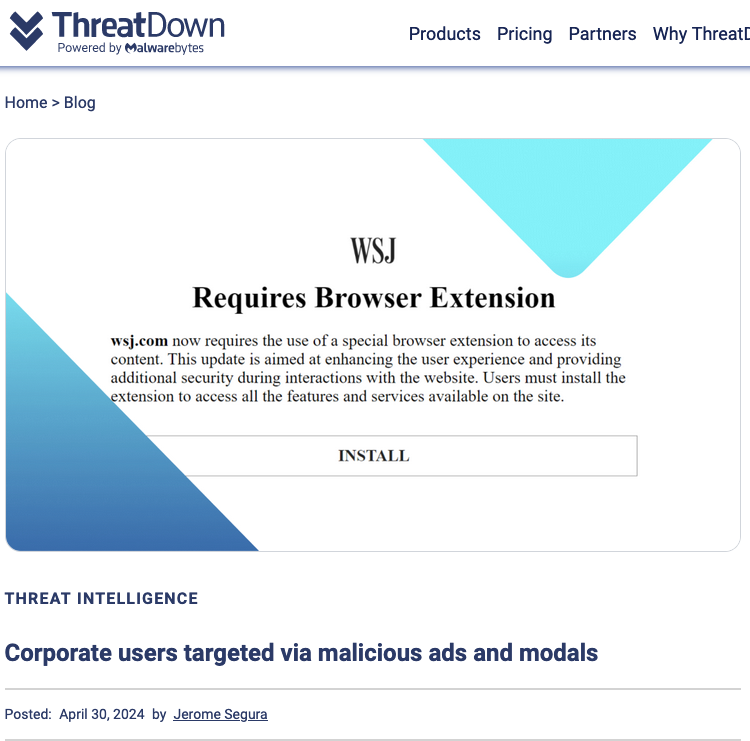
Image: threatdown.com
The top-level domain for the United States — .US — is home to thousands of newly-registered domains tied to a malicious link shortening service that facilitates malware and phishing scams, new research suggests. The findings come close on the heels of a report that identified .US domains as among the most prevalent in phishing attacks over the past year.
Researchers at Infoblox say they’ve been tracking what appears to be a three-year-old link shortening service that is catering to phishers and malware purveyors. Infoblox found the domains involved are typically three to seven characters long, and hosted on bulletproof hosting providers that charge a premium to ignore any abuse or legal complaints. The short domains don’t host any content themselves, but are used to obfuscate the real address of landing pages that try to phish users or install malware.
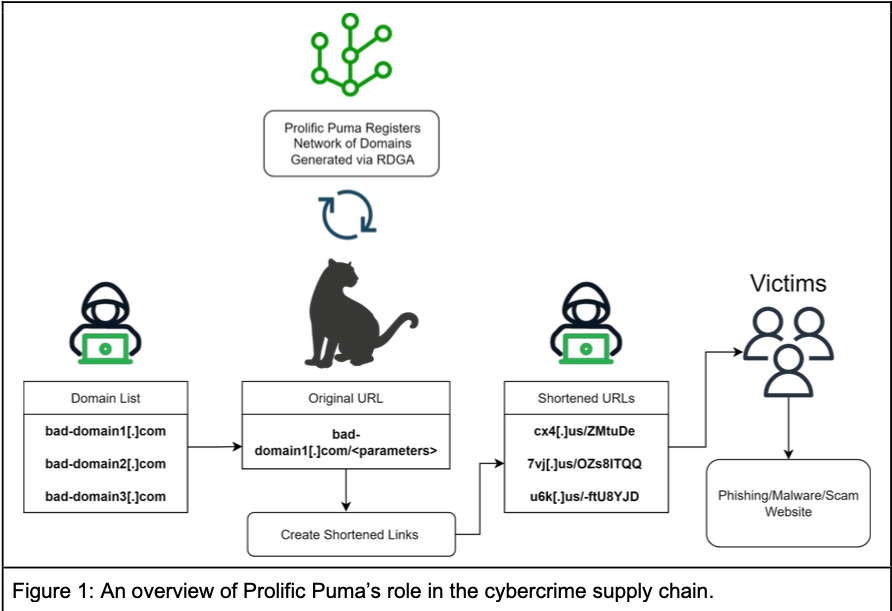
A graphic describing the operations of a malicious link shortening service that Infoblox has dubbed “Prolific Puma.”
Infoblox says it’s unclear how the phishing and malware landing pages tied to this service are being initially promoted, although they suspect it is mainly through scams targeting people on their phones via SMS. A new report says the company mapped the contours of this link shortening service thanks in part to pseudo-random patterns in the short domains, which all appear on the surface to be a meaningless jumble of letters and numbers.
“This came to our attention because we have systems that detect registrations that use domain name generation algorithms,” said Renee Burton, head of threat intelligence at Infoblox. “We have not found any legitimate content served through their shorteners.”
Infoblox determined that until May 2023, domains ending in .info accounted for the bulk of new registrations tied to the malicious link shortening service, which Infoblox has dubbed “Prolific Puma.” Since then, they found that whoever is responsible for running the service has used .US for approximately 55 percent of the total domains created, with several dozen new malicious .US domains registered daily.
.US is overseen by the National Telecommunications and Information Administration (NTIA), an executive branch agency of the U.S. Department of Commerce. But Uncle Sam has long outsourced the management of .US to various private companies, which have gradually allowed the United States’s top-level domain to devolve into a cesspool of phishing activity.
Or so concludes The Interisle Consulting Group, which gathers phishing data from multiple industry sources and publishes an annual report on the latest trends. As far back as 2018, Interisle found .US domains were the worst in the world for spam, botnet (attack infrastructure for DDOS etc.) and illicit or harmful content.
Interisle’s newest study examined six million phishing reports between May 1, 2022 and April 30, 2023, and identified approximately 30,000 .US phishing domains. Interisle found significant numbers of .US domains were registered to attack some of the United States’ most prominent companies, including Bank of America, Amazon, Apple, AT&T, Citi, Comcast, Microsoft, Meta, and Target. Others were used to impersonate or attack U.S. government agencies.
Under NTIA regulations, domain registrars processing .US domain registrations must take certain steps (PDF) to verify that those customers actually reside in the United States, or else own organizations based in the U.S. However, if one registers a .US domain through GoDaddy — the largest domain registrar and the current administrator of the .US contract — the way one “proves” their U.S. nexus is simply by choosing from one of three pre-selected affirmative responses.
In an age when most domain registrars are automatically redacting customer information from publicly accessible registration records to avoid running afoul of European privacy laws, .US has remained something of an outlier because its charter specifies that all registration records be made public. However, Infoblox said it found more than 2,000 malicious link shortener domains ending in .US registered since October 2023 through NameSilo that have somehow subverted the transparency requirements for the usTLD and converted to private registrations.
“Through our own experience with NameSilo, it is not possible to select private registration for domains in the usTLD through their interface,” Infoblox wrote. “And yet, it was done. Of the total domains with private records, over 99% were registered with NameSilo. At this time, we are not able to explain this behavior.”
NameSilo CEO Kristaps Ronka said the company actively responds to reports about abusive domains, but that it hasn’t seen any abuse reports related to Infoblox’s findings.
“We take down hundreds to thousands of domains, lots of them proactively to combat abuse,” Ronka said. “Our current abuse rate on abuseIQ for example is currently at 0%. AbuseIQ receives reports from countless sources and we are yet to see these ‘Puma’ abuse reports.”
Experts who track domains associated with malware and phishing say even phony information supplied at registration is useful in identifying potentially malicious or phishous domains before they can be used for abuse.
For example, when it was registered through NameSilo in July 2023, the domain 1ox[.]us — like thousands of others — listed its registrant as “Leila Puma” at a street address in Poland, and the email address blackpumaoct33@ukr.net. But according to DomainTools.com, on Oct. 1, 2023 those records were redacted and hidden by NameSilo.
Infoblox notes that the username portion of the email address appears to be a reference to the song October 33 by the Black Pumas, an Austin, Texas based psychedelic soul band. The Black Pumas aren’t exactly a household name, but they did recently have a popular Youtube video that featured a cover of the Kinks song “Strangers,” which included an emotional visual narrative about Ukrainians seeking refuge from the Russian invasion, titled “Ukraine Strangers.” Also, Leila Puma’s email address is at a Ukrainian email provider.
DomainTools shows that hundreds of other malicious domains tied to Prolific Puma previously were registered through NameCheap to a “Josef Bakhovsky” at a different street address in Poland. According to ancestry.com, the anglicized version of this surname — Bakovski — is the traditional name for someone from Bakowce, which is now known as Bakivtsi and is in Ukraine.
This possible Polish and/or Ukrainian connection may or may not tell us something about the “who” behind this link shortening service, but those details are useful for identifying and grouping these malicious short domains. However, even this meager visibility into .US registration data is now under threat.
The NTIA recently published a proposal that would allow registrars to redact all registrant data from WHOIS registration records for .US domains. A broad array of industry groups have filed comments opposing the proposed changes, saying they threaten to remove the last vestiges of accountability for a top-level domain that is already overrun with cybercrime activity.
Infoblox’s Burton says Prolific Puma is remarkable because they’ve been able to facilitate malicious activities for years while going largely unnoticed by the security industry.
“This exposes how persistent the criminal economy can be at a supply chain level,” Burton said. “We’re always looking at the end malware or phishing page, but what we’re finding here is that there’s this middle layer of DNS threat actors persisting for years without notice.”
Infoblox’s full report on Prolific Puma is here.
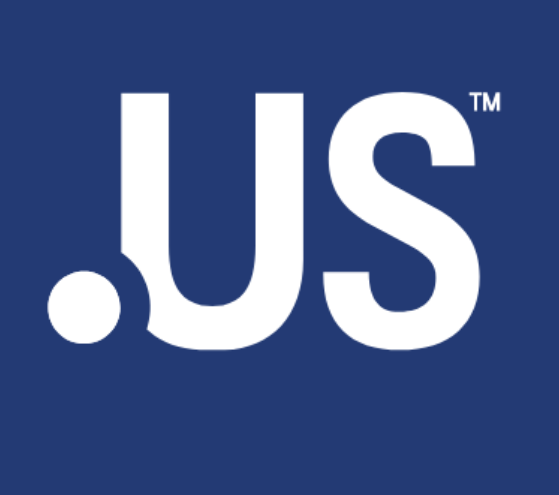
Domain names ending in “.US” — the top-level domain for the United States — are among the most prevalent in phishing scams, new research shows. This is noteworthy because .US is overseen by the U.S. government, which is frequently the target of phishing domains ending in .US. Also, .US domains are only supposed to be available to U.S. citizens and to those who can demonstrate that they have a physical presence in the United States.
.US is the “country code top-level domain” or ccTLD of the United States. Most countries have their own ccTLDs: .MX for Mexico, for example, or .CA for Canada. But few other major countries in the world have anywhere near as many phishing domains each year as .US.
That’s according to The Interisle Consulting Group, which gathers phishing data from multiple industry sources and publishes an annual report on the latest trends. Interisle’s newest study examined six million phishing reports between May 1, 2022 and April 30, 2023, and found 30,000 .US phishing domains.
.US is overseen by the National Telecommunications and Information Administration (NTIA), an executive branch agency of the U.S. Department of Commerce. However, NTIA currently contracts out the management of the .US domain to GoDaddy, by far the world’s largest domain registrar.
Under NTIA regulations, the administrator of the .US registry must take certain steps to verify that their customers actually reside in the United States, or own organizations based in the U.S. But Interisle found that whatever GoDaddy was doing to manage that vetting process wasn’t working.
“The .US ‘nexus’ requirement theoretically limits registrations to parties with a national connection, but .US had very high numbers of phishing domains,” Interisle wrote. “This indicates a possible problem with the administration or application of the nexus requirements.”
Dean Marks is emeritus executive director for a group called the Coalition for Online Accountability, which has been critical of the NTIA’s stewardship of .US. Marks says virtually all European Union member state ccTLDs that enforce nexus restrictions also have massively lower levels of abuse due to their policies and oversight.
“Even very large ccTLDs, like .de for Germany — which has a far larger market share of domain name registrations than .US — have very low levels of abuse, including phishing and malware,” Marks told KrebsOnSecurity. “In my view, this situation with .US should not be acceptable to the U.S. government overall, nor to the US public.”
Marks said there are very few phishing domains ever registered in other ccTLDs that also restrict registrations to their citizens, such as .HU (Hungary), .NZ (New Zealand), and .FI (Finland), where a connection to the country, a proof of identity, or evidence of incorporation are required.
“Or .LK (Sri Lanka), where the acceptable use policy includes a ‘lock and suspend’ if domains are reported for suspicious activity,” Marks said. “These ccTLDs make a strong case for validating domain registrants in the interest of public safety.”
Sadly, .US has been a cesspool of phishing activity for many years. As far back as 2018, Interisle found .US domains were the worst in the world for spam, botnet (attack infrastructure for DDOS etc.) and illicit or harmful content. Back then, .US was being operated by a different contractor.
In response to questions from KrebsOnSecurity, GoDaddy said all .US registrants must certify that they meet the NTIA’s nexus requirements. But this appears to be little more than an affirmative response that is already pre-selected for all new registrants.
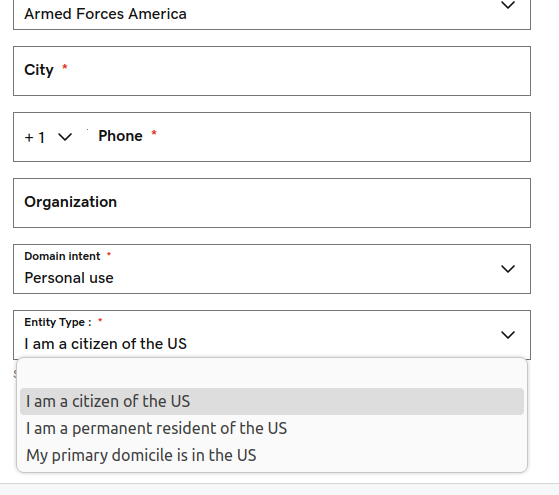
Attempting to register a .US domain through GoDaddy, for example, leads to a U.S. Registration Information page that auto-populates the nexus attestation field with the response, “I am a citizen of the US.” Other options include, “I am a permanent resident of the US,” and “My primary domicile is in the US.” It currently costs just $4.99 to obtain a .US domain through GoDaddy.
GoDaddy said it also conducts a scan of selected registration request information, and conducts “spot checks” on registrant information.
“We conduct regular reviews, per policy, of registration data within the Registry database to determine Nexus compliance with ongoing communications to registrars and registrants,” the company said in a written statement.
GoDaddy says it “is committed to supporting a safer online environment and proactively addressing this issue by assessing it against our own anti-abuse mitigation system.”
“We stand against DNS abuse in any form and maintain multiple systems and protocols to protect all the TLDs we operate,” the statement continued. “We will continue to work with registrars, cybersecurity firms and other stakeholders to make progress with this complex challenge.”
Interisle found significant numbers of .US domains were registered to attack some of the United States’ most prominent companies, including Bank of America, Amazon, Apple, AT&T, Citi, Comcast, Microsoft, Meta, and Target.
“Ironically, at least 109 of the .US domains in our data were used to attack the United States government, specifically the United States Postal Service and its customers,” Interisle wrote. “.US domains were also used to attack foreign government operations: six .US domains were used to attack Australian government services, six attacked Great’s Britain’s Royal Mail, one attacked Canada Post, and one attacked the Denmark Tax Authority.”
The NTIA recently published a proposal that would allow GoDaddy to redact registrant data from WHOIS registration records. The current charter for .US specifies that all .US registration records be public.
Interisle argues that without more stringent efforts to verify a United States nexus for new .US domain registrants, the NTIA’s proposal will make it even more difficult to identify phishers and verify registrants’ identities and nexus qualifications.
In a written statement, the NTIA said DNS abuse is a priority issue for the agency, and that NTIA supports “evidence-based policymaking.”
“We look forward to reviewing the report and will engage with our contractor for the .US domain on steps that we can take not only to address phishing, but the other forms of DNS abuse as well,” the statement reads.
Interisle sources its phishing data from several places, including the Anti-Phishing Working Group (APWG), OpenPhish, PhishTank, and Spamhaus. For more phishing facts, see Interisle’s 2023 Phishing Landscape report (PDF).’
Update, Sept. 5, 1:44 p.m. ET: Updated story with statement provided today by the NTIA.
A new breach involving data from nine million AT&T customers is a fresh reminder that your mobile provider likely collects and shares a great deal of information about where you go and what you do with your mobile device — unless and until you affirmatively opt out of this data collection. Here’s a primer on why you might want to do that, and how.
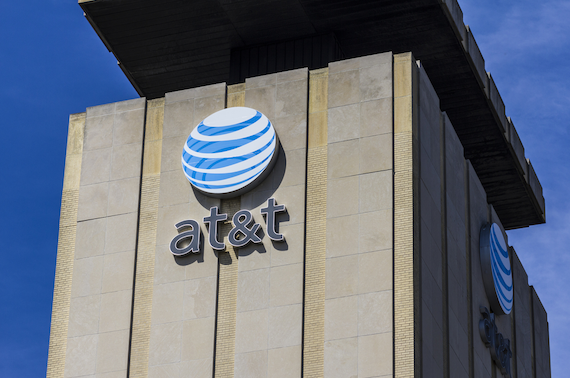
Image: Shutterstock
Telecommunications giant AT&T disclosed this month that a breach at a marketing vendor exposed certain account information for nine million customers. AT&T said the data exposed did not include sensitive information, such as credit card or Social Security numbers, or account passwords, but was limited to “Customer Proprietary Network Information” (CPNI), such as the number of lines on an account.
Certain questions may be coming to mind right now, like “What the heck is CPNI?” And, ‘If it’s so ‘customer proprietary,’ why is AT&T sharing it with marketers?” Also maybe, “What can I do about it?” Read on for answers to all three questions.
AT&T’s disclosure said the information exposed included customer first name, wireless account number, wireless phone number and email address. In addition, a small percentage of customer records also exposed the rate plan name, past due amounts, monthly payment amounts and minutes used.
CPNI refers to customer-specific “metadata” about the account and account usage, and may include:
-Called phone numbers
-Time of calls
-Length of calls
-Cost and billing of calls
-Service features
-Premium services, such as directory call assistance
According to a succinct CPNI explainer at TechTarget, CPNI is private and protected information that cannot be used for advertising or marketing directly.
“An individual’s CPNI can be shared with other telecommunications providers for network operating reasons,” wrote TechTarget’s Gavin Wright. “So, when the individual first signs up for phone service, this information is automatically shared by the phone provider to partner companies.”
Is your mobile Internet usage covered by CPNI laws? That’s less clear, as the CPNI rules were established before mobile phones and wireless Internet access were common. TechTarget’s CPNI primer explains:
“Under current U.S. law, cellphone use is only protected as CPNI when it is being used as a telephone. During this time, the company is acting as a telecommunications provider requiring CPNI rules. Internet use, websites visited, search history or apps used are not protected CPNI because the company is acting as an information services provider not subject to these laws.”
Hence, the carriers can share and sell this data because they’re not explicitly prohibited from doing so. All three major carriers say they take steps to anonymize the customer data they share, but researchers have shown it is not terribly difficult to de-anonymize supposedly anonymous web-browsing data.
“Your phone, and consequently your mobile provider, know a lot about you,” wrote Jack Morse for Mashable. “The places you go, apps you use, and the websites you visit potentially reveal all kinds of private information — e.g. religious beliefs, health conditions, travel plans, income level, and specific tastes in pornography. This should bother you.”
Happily, all of the U.S. carriers are required to offer customers ways to opt out of having data about how they use their devices shared with marketers. Here’s a look at some of the carrier-specific practices and opt-out options.
AT&T’s policy says it shares device or “ad ID”, combined with demographics including age range, gender, and ZIP code information with third parties which explicitly include advertisers, programmers, and networks, social media networks, analytics firms, ad networks and other similar companies that are involved in creating and delivering advertisements.
AT&T said the data exposed on 9 million customers was several years old, and mostly related to device upgrade eligibility. This may sound like the data went to just one of its partners who experienced a breach, but in all likelihood it also went to hundreds of AT&T’s partners.
AT&T’s CPNI opt-out page says it shares CPNI data with several of its affiliates, including WarnerMedia, DirecTV and Cricket Wireless. Until recently, AT&T also shared CPNI data with Xandr, whose privacy policy in turn explains that it shares data with hundreds of other advertising firms. Microsoft bought Xandr from AT&T last year.
According to the Electronic Privacy Information Center (EPIC), T-Mobile seems to be the only company out of the big three to extend to all customers the rights conferred by the California Consumer Privacy Act (CCPA).
EPIC says T-Mobile customer data sold to third parties uses another unique identifier called mobile advertising IDs or “MAIDs.” T-Mobile claims that MAIDs don’t directly identify consumers, but under the CCPA MAIDs are considered “personal information” that can be connected to IP addresses, mobile apps installed or used with the device, any video or content viewing information, and device activity and attributes.
T-Mobile customers can opt out by logging into their account and navigating to the profile page, then to “Privacy and Notifications.” From there, toggle off the options for “Use my data for analytics and reporting” and “Use my data to make ads more relevant to me.”
Verizon’s privacy policy says it does not sell information that personally identities customers (e.g., name, telephone number or email address), but it does allow third-party advertising companies to collect information about activity on Verizon websites and in Verizon apps, through MAIDs, pixels, web beacons and social network plugins.
According to Wired.com’s tutorial, Verizon users can opt out by logging into their Verizon account through a web browser or the My Verizon mobile app. From there, select the Account tab, then click Account Settings and Privacy Settings on the web. For the mobile app, click the gear icon in the upper right corner and then Manage Privacy Settings.
On the privacy preferences page, web users can choose “Don’t use” under the Custom Experience section. On the My Verizon app, toggle any green sliders to the left.
EPIC notes that all three major carriers say resetting the consumer’s device ID and/or clearing cookies in the browser will similarly reset any opt-out preferences (i.e., the customer will need to opt out again), and that blocking cookies by default may also block the opt-out cookie from being set.
T-Mobile says its opt out is device-specific and/or browser-specific. “In most cases, your opt-out choice will apply only to the specific device or browser on which it was made. You may need to separately opt out from your other devices and browsers.”
Both AT&T and Verizon offer opt-in programs that gather and share far more information, including device location, the phone numbers you call, and which sites you visit using your mobile and/or home Internet connection. AT&T calls this their Enhanced Relevant Advertising Program; Verizon’s is called Custom Experience Plus.
In 2021, multiple media outlets reported that some Verizon customers were being automatically enrolled in Custom Experience Plus — even after those customers had already opted out of the same program under its previous name — “Verizon Selects.”
If none of the above opt out options work for you, at a minimum you should be able to opt out of CPNI sharing by calling your carrier, or by visiting one of their stores.
Why should you opt out of sharing CPNI data? For starters, some of the nation’s largest wireless carriers don’t have a great track record in terms of protecting the sensitive information that you give them solely for the purposes of becoming a customer — let alone the information they collect about your use of their services after that point.
In January 2023, T-Mobile disclosed that someone stole data on 37 million customer accounts, including customer name, billing address, email, phone number, date of birth, T-Mobile account number and plan details. In August 2021, T-Mobile acknowledged that hackers made off with the names, dates of birth, Social Security numbers and driver’s license/ID information on more than 40 million current, former or prospective customers who applied for credit with the company.
Last summer, a cybercriminal began selling the names, email addresses, phone numbers, SSNs and dates of birth on 23 million Americans. An exhaustive analysis of the data strongly suggested it all belonged to customers of one AT&T company or another. AT&T stopped short of saying the data wasn’t theirs, but said the records did not appear to have come from its systems and may be tied to a previous data incident at another company.
However frequently the carriers may alert consumers about CPNI breaches, it’s probably nowhere near often enough. Currently, the carriers are required to report a consumer CPNI breach only in cases “when a person, without authorization or exceeding authorization, has intentionally gained access to, used or disclosed CPNI.”
But that definition of breach was crafted eons ago, back when the primary way CPNI was exposed was through “pretexting,” such when the phone company’s employees are tricked into giving away protected customer data.
In January, regulators at the U.S. Federal Communications Commission (FCC) proposed amending the definition of “breach” to include things like inadvertent disclosure — such as when companies expose CPNI data on a poorly-secured server in the cloud. The FCC is accepting public comments on the matter until March 24, 2023.
While it’s true that the leak of CPNI data does not involve sensitive information like Social Security or credit card numbers, one thing AT&T’s breach notice doesn’t mention is that CPNI data — such as balances and payments made — can be abused by fraudsters to make scam emails and text messages more believable when they’re trying to impersonate AT&T and phish AT&T customers.
The other problem with letting companies share or sell your CPNI data is that the wireless carriers can change their privacy policies at any time, and you are assumed to be okay with those changes as long as you keep using their services.
For example, location data from your wireless device is most definitely CPNI, and yet until very recently all of the major carriers sold their customers’ real-time location data to third party data brokers without customer consent.
What was their punishment? In 2020, the FCC proposed fines totaling $208 million against all of the major carriers for selling their customers’ real-time location data. If that sounds like a lot of money, consider that all of the major wireless providers reported tens of billions of dollars in revenue last year (e.g., Verizon’s consumer revenue alone was more than $100 billion last year).
If the United States had federal privacy laws that were at all consumer-friendly and relevant to today’s digital economy, this kind of data collection and sharing would always be opt-in by default. In such a world, the enormously profitable wireless industry would likely be forced to offer clear financial incentives to customers who choose to share this information.
But until that day arrives, understand that the carriers can change their data collection and sharing policies when it suits them. And regardless of whether you actually read any notices about changes to their privacy policies, you will have agreed to those changes as long as you continue using their service.